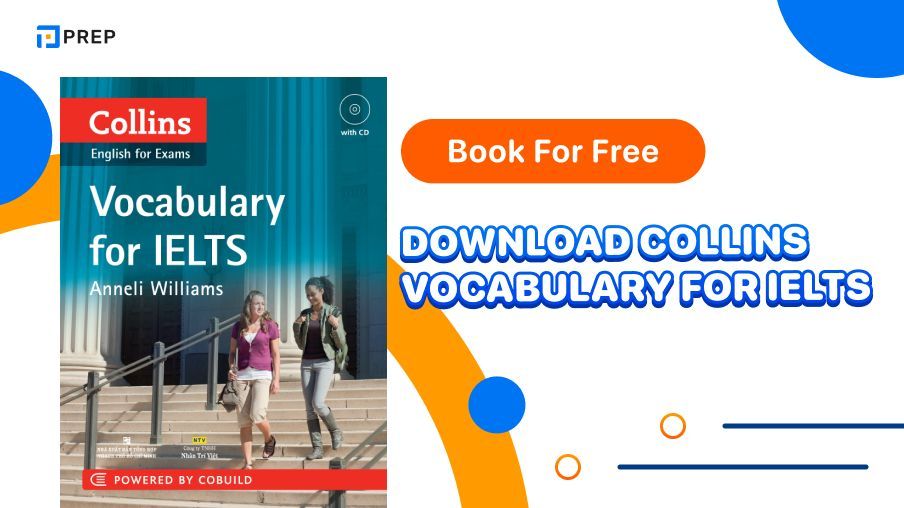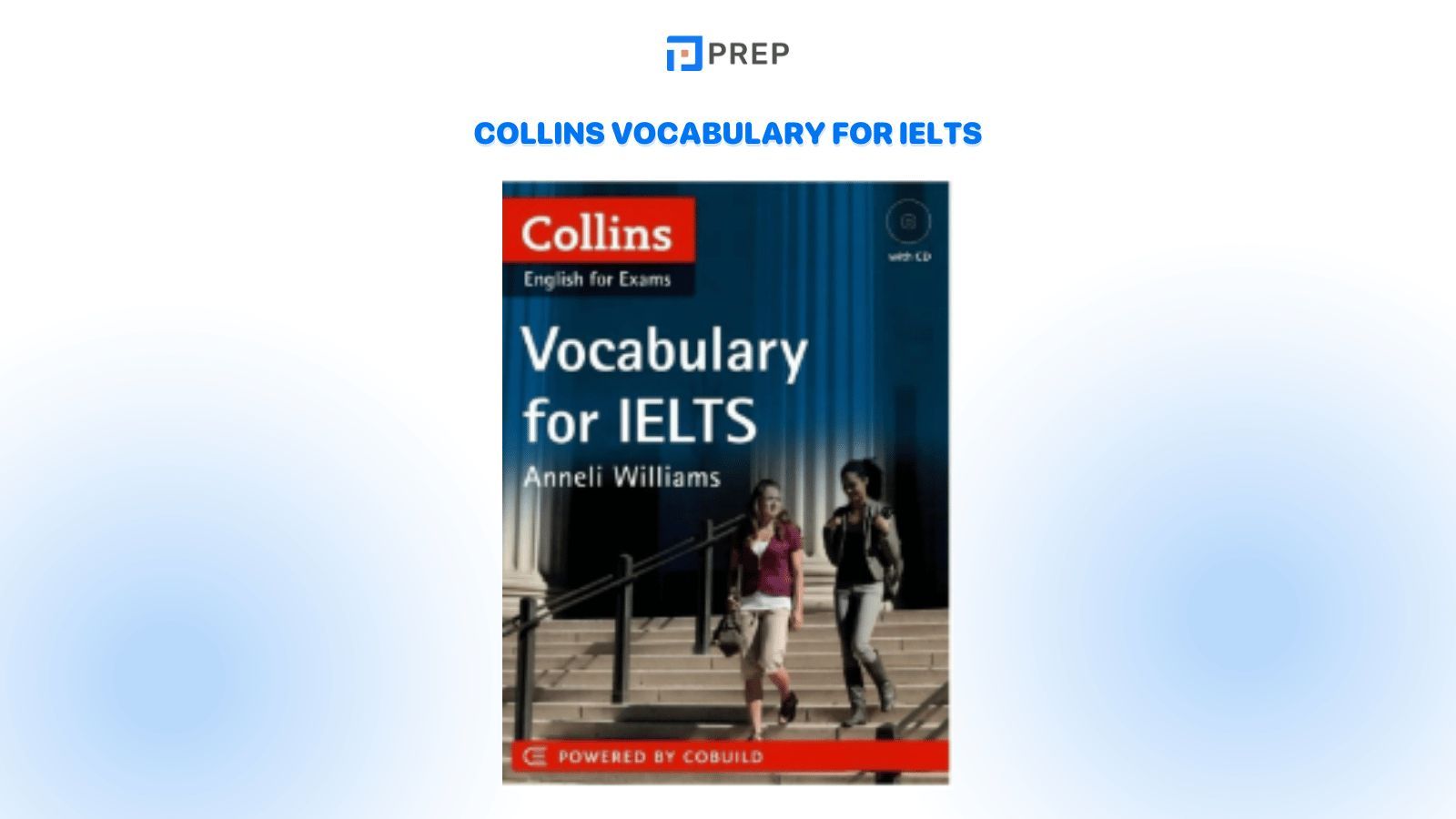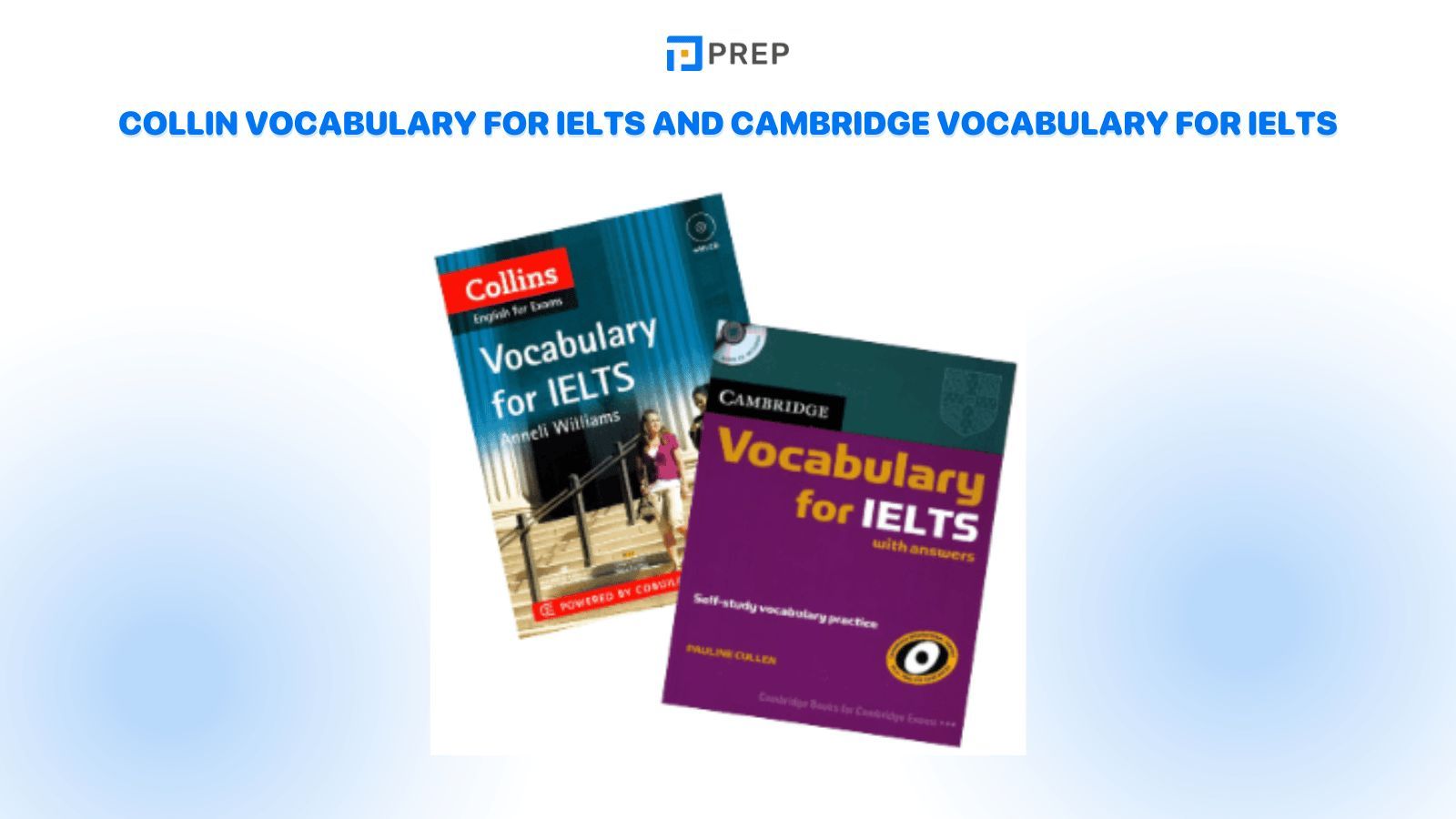Download Collins Vocabulary for IELTS book for free
Collins Vocabulary for IELTS book is one of the famous books by Collins that is well-known among test-takers. It covers 20 familiar and simple topics that comprehensively encompass the necessary vocabulary for the IELTS exam. In today's article, PREP will provide you with the most detailed information about the book as well as the link to download the beautiful version for free!
- I. General Introduction to Collins Vocabulary for IELTS book
- II. Content of Collins Vocabulary for IELTS book
- III. Advantages and Disadvantages of Collins Vocabulary for IELTS book
- IV. Comparison between Collins Vocabulary for IELTS book and Cambridge Vocabulary for IELTS book
- V. Guide to studying Collins Vocabulary for IELTS book

I. General Introduction to Collins Vocabulary for IELTS book
1. General information about Collins Vocabulary for IELTS book
Collins Vocabulary for IELTS book is a good book for candidates preparing for the IELTS exam at home. Let's explore the general information about this resource together:

|
In each unit, you will practice exercises that simulate real IELTS tests. The activities in each lesson help you develop the skills and vocabulary needed to tackle the exam. Key vocabulary and exam tips are highlighted throughout the book.
2. Target users of Collins Vocabulary for IELTS book
Based on the level of difficulty and vocabulary quantity, this book is considered suitable for candidates at the IELTS level of 6.0 and above, aiming for a score of 6.5+. The book focuses on the most important and frequently encountered vocabulary and grammar in the current IELTS exam.
II. Content of Collins Vocabulary for IELTS book
1. Table of Contents of the book
|
Unit |
Category |
Unit |
Category |
|
Unit 1 |
People and relationships |
Unit 11 |
Words for describing graphs and diagrams |
|
Unit 2 |
Health |
Unit 12 |
Words for describing a change |
|
Unit 3 |
Education |
Unit 13 |
Words expressing similarity and difference |
|
Unit 4 |
Adventure |
Unit 14 |
Words describing cause and effect |
|
Unit 5 |
Gadgets |
Unit 15 |
Signposting expressions for writing |
|
Unit 6 |
Cities |
Unit 16 |
Adverbs |
|
Unit 7 |
The art of persuasion |
Unit 17 |
Words for problems and solutions |
|
Unit 8 |
Getting involved |
Unit 18 |
Words for talking about ideas |
|
Unit 9 |
Global warming |
Unit 19 |
Emphasis and understatement |
|
Unit 10 |
Revision 1 |
Unit 20 |
Revision 2 Audio script Answer key Collocations IELTS information |
2. Content division of lessons
- Lessons 1-9: Vocabulary related to everyday life topics such as health, education, etc.
- Lesson 10: Review of vocabulary learned in Lessons 1-9.
- Lessons 11-19: Compilation of vocabulary groups expressing functions such as solutions, problems, remedies, etc.
- Lesson 20: Review of vocabulary learned in Lessons 11-19. Additionally, diverse topics related to finance, people, education, environment, health, etc., are covered.
Lessons 10 and 20 provide opportunities for you to solidify the knowledge learned from previous lessons and reinforce your skills in using phrases or understanding the meanings of less commonly seen words in different contexts.
3. Structure of the book
- Part 1: Vocabulary lists organized by topic for each lesson.
- Part 2: Exercises to help you immediately recall the previously learned vocabulary and understand how to apply them in various contexts.
- Part 3: Test exercises similar to real exam questions, accompanied by markers and useful advice.
The Collins Vocabulary for IELTS book is divided into sections, allowing you to study in a sequential and easier-to-remember manner. After accumulating an adequate amount of vocabulary, you will have the opportunity to take a test to assess your current proficiency level.
Additionally, the book provides tips for answering questions, memorizing vocabulary, and grammar, allowing you to improve and increase your scores.
To effectively learn vocabulary, it is recommended to practice and review repeatedly. Therefore, a piece of advice for you is to avoid writing the answer directly in the book so that you can use it later for reviewing and revisiting the knowledge.
III. Advantages and Disadvantages of Collins Vocabulary for IELTS book
1. Advantages
- Vocabulary in Collins Vocabulary for IELTS book is organized by topic, making it easy for learners to study and remember. Additionally, the presentation of vocabulary by topic is clear, readable, and easy to search. When you forget a word, you can quickly find it conveniently.
- Learning vocabulary through exercises and answering questions in this book helps improve your ability to quickly memorize vocabulary. It is not as boring as traditional note-taking methods.
- The "Exam tips" section provides useful tips to help you choose the correct answers quickly. You can apply these strategies to similar exercises.
2. Disadvantages
The only disadvantage is that Collins Vocabulary for IELTS book is suitable for learners who already have a foundation in English. For beginners, it is recommended to refer to lighter books, as Collins Vocabulary for IELTS book mainly focuses on vocabulary related to specific fields.
IV. Comparison between Collins Vocabulary for IELTS book and Cambridge Vocabulary for IELTS book

|
Cambridge Vocabulary for IELTS |
Collin Vocabulary for IELTS |
|
|
Publication Year |
2008 |
2012 |
|
Publisher |
Cambridge University Press |
HarperCollins UK |
|
Target Learner Level |
5.5-8.0 |
6.0+ |
|
Number of Units |
25 Units |
18 Units & 2 Revision sections |
|
Outline |
Each unit consists of 3 pages and Test Practice sections. |
Each unit consists of 3 pages and Test Practice sections. |
|
Images |
Very few images |
Very few images, almost no illustrations. |
|
User Target |
Suitable for self-study and as a textbook. |
|
| Key Features |
It has an online learning software available on Android and iOS platforms for convenient and easy review. The content covers a variety of topics from basic to advanced. |
New vocabulary is placed at the beginning of each unit, allowing learners to spend time building vocabulary before doing exercises. The content covers a diverse range of topics. |
Of course, each book has its own advantages. Let's point them out:
- Publisher: Cambridge has an advantage in terms of reputation as they organize the IELTS exam, so the content of their book will be more closely aligned with the actual IELTS exam.
- Publication Year: Collins Vocabulary for IELTS book was published in 2012, so it may have more recent updates compared to the Cambridge book.
- Target Learner Level: Both books are suitable for learners at a similar level. The Cambridge book is designed for learners from 5.5, while Collins Vocabulary for IELTS book is for learners at a 6.0 IELTS level and above.
It is recommended to combine studying both of these useful books to enhance comprehensive knowledge and maximize vocabulary and grammar practice for the IELTS exam. You can start with the Cambridge Vocabulary for IELTS as the vocabulary difficulty in that book is lighter compared to Collins Vocabulary for IELTS.
V. Guide to studying Collins Vocabulary for IELTS book
To effectively use Collins Vocabulary for IELTS book and make the most of the book, here are some optimal study methods you can refer to:
- Focus on learning all the vocabulary in Part 1: You should go through all the vocabulary in each unit and then practice the vocabulary exercises to apply and memorize the words you have learned. Only after that should you start doing IELTS exams to avoid feeling overwhelmed.
- Practice grammar regularly: Grammar is also a crucial factor in achieving high scores in exams. Therefore, you should regularly practice grammar by constructing sentences or writing paragraphs that contain the grammar points you have learned.
- Take notes of important points in a notebook: Develop the habit of jotting down important points so that when you forget, you have something to refer back to. Pay special attention to noting down any mistakes you make in exercises to learn from them and avoid repeating them in the future.
- Read the Exam tips: Don't forget to read the Exam tips in the boxes. They provide you with many useful tips and strategies to help you easily conquer the IELTS exam.
- In the Exam tip below, it guides you on distinguishing different parts of speech and recognizing the characteristics of adjectives to avoid confusion when answering questions.
- Furthermore, the Exam tips are also available in some listening sections to guide you on effective strategies before listening. In the example below, the tip is to pay attention to listening for adjectives and key information in the context.
PREP hopes this article about the Collins Vocabulary for IELTS book will be helpful to you in finding reputable study materials to enhance your vocabulary for the IELTS exam. Wish you good studying!

Hi I'm Chloe, and I am currently serving as an Product Content Administrator at Prep Education. With over five years of experience in independent online IELTS study and exam preparation, I am confident in my ability to support learners in achieving their highest possible scores.
Comment
Premium content
View allPersonalized roadmap
Most read












